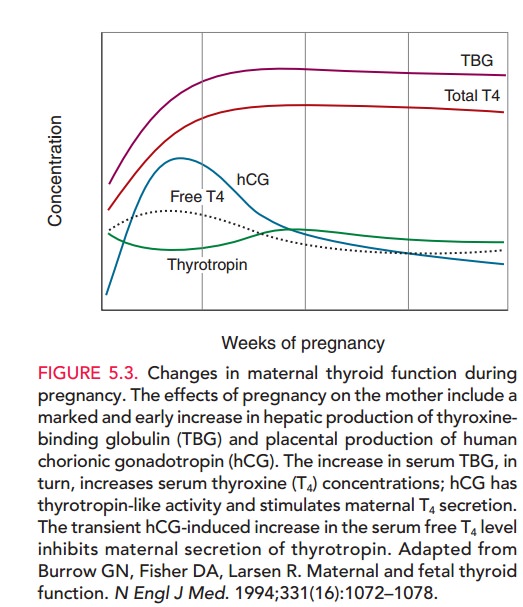Chapter: Obstetrics and Gynecology: Maternal-Fetal Physiology
Maternal Physiology: Endocrine System
Endocrine System
Pregnancy influences the
production of several endocrine hormones that control the physiologic
adaptations in other organ systems.
THYROID FUNCTION
Pregnancy
produces an overall euthyroid state,
despite sev-eral changes in thyroid regulation. The
thyroid gland enlargesmoderately during pregnancy, but does not produce
thy-romegaly or goiter. In the first trimester, human chori-onic gonadotropin
(hCG), which has thyrotropin-like activity, stimulates maternal thyroxine (T4)
secretion and produces a transient rise in the free T4
concentra-tion (Fig. 5.3). The decline in placental hCG produc-tion following
the first trimester results in normalization of free T4
concentrations. Beginning early in pregnancy, estrogen induces hepatic
synthesis of thyroxine-binding globulin (TBG), resulting in an increase in
total T4 and total triiodothyronine (T3) levels. Levels
of free T4 and free T3, the active hormones, are
unchanged from the normal range for nonpregnant patients.

ADRENAL FUNCTION
Although
pregnancy does not alter the size or morphology of the adrenal gland, it does
influence hormone synthesis. As with TBG,estrogen induces
hepatic synthesis of cortisol-binding globulin, resulting in elevated levels of
serum cortisol. The concentration of free plasma cortisol progressively
Levels of corticotropin (ACTH) rise in conjunction with
serum cortisol. Levels of aldosterone increase markedly due to enhanced adrenal
synthesis. Maternal levels of deoxy-corticosterone increase as the result of
estrogen stimu-lation of renal synthesis, rather than increased adrenal
production. Maternal levels of dehydroepiandrosterone sulfate decrease due to
increased hepatic uptake and conversion to estrogen.
Related Topics